

E-Corpus. Repository maps. Institutional repository software comparison. The Guidelines to compare Institutional Repository Software have been published as part of UNESCO’s Open Access Strategy.
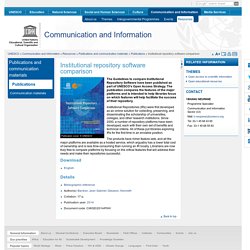
The publication compares the features of the major platforms and is intended to help libraries focus on which features will help facilitate the success of their repository. Institutional Repositories (IRs) were first developed as an online solution for collecting, preserving, and disseminating the scholarship of universities, colleges, and other research institutions. Since 2000, a number of repository platforms have been developed, each with their own set of benefits and technical criteria. CONTENTdm Digital Collection Management Software by OCLC.
CONTENTdm® makes everything in your digital collections available to everyone, everywhere. No matter the format — local history archives, newspapers, books, maps, slide libraries or audio/video — CONTENTdm can handle the storage, management and delivery of your collections to users across the Web. – feillet
OCLC CONTENTdm. DuraSpace Technologies. The DuraSpace technology portfolio crosses the boundaries of institutional systems, the Web, and cloud infrastructure and inherently addresses representation and preservation of digital content.
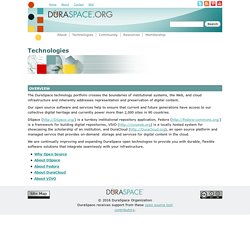
Our open source software and services help to ensure that current and future generations have access to our collective digital heritage and currently power more than 2,000 sites in 90 countries. DSpace ( is a turnkey institutional repository application, Fedora ( is a framework for building digital repositories, VIVO ( is a locally hosted system for showcasing the scholarship of an institution, and DuraCloud ( an open source platform and managed service that provides on-demand storage and services for digital content in the cloud. We are continually improving and expanding DuraSpace open technologies to provide you with durable, flexible software solutions that integrate seamlessly with your infrastructure.
DSPACE. Fedora Repository. Open source software and an ontology for representing scholarship. Open Access Institutional Repository Software. Open-source digital repository platform. About EPrints Welcome to the home of EPrints, the world-leading open-source digital repository platform.
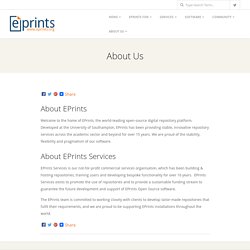
Developed at the University of Southampton, EPrints has been providing stable, innovative repository services across the academic sector and beyond for over 15 years. We are proud of the stability, flexibility and pragmatism of our software. About EPrints Services EPrints Services is our not-for-profit commercial services organisation, which has been building & hosting repositories, training users and developing bespoke functionality for over 10 years. The EPrints team is committed to working closely with clients to develop tailor-made repositories that fulfil their requirements, and we are proud to be supporting EPrints installations throughout the world.
Islandora Website. eSciDoc.PubMan, a publication repository software. MPG.PuRe This is the publication repository of the Max Planck Society.
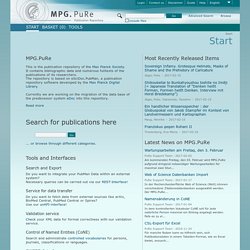
It contains bibliographic data and numerous fulltexts of the publications of its researchers. The repository is based on eSciDoc.PubMan, a publication repository software developed by the Max Planck Digital Library. Currently we are working on the migration of the data base of the predecessor system eDoc into this repository. Read more Search for publications here ... or browse through different categories. MyCoRe download - My Content Repository - open source repository software framework for building disciplinary or institutional repositories. OPUS 4 - open source software package for creating Open Access repositories. Institutional Repositories. Institutional Repositories (IRs) can be directly loaded into EBSCO Discovery Serviceso that they can be fully searched alongside all other EDS resources/content.
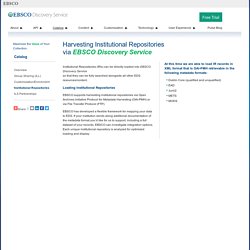
Loading Institutional Repositories EBSCO supports harvesting institutional repositories via Open Archives Initiative Protocol for Metadata Harvesting (OAI-PMH) or via File Transfer Protocol (FTP). EBSCO has developed a flexible framework for mapping your data to EDS. If your institution sends along additional documentation of the metadata format you’d like for us to support, including a full dataset of your records, EBSCO can investigate integration options.
Each unique institutional repository is analyzed for optimized loading and display. At this time we are able to load IR records in XML format that is OAI-PMH retrievable in the following metadata formats: PURL help. What is a PURL?
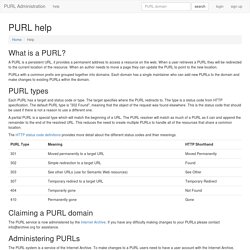
A PURL is a persistent URL, it provides a permanent address to access a resource on the web. When a user retrieves a PURL they will be redirected to the current location of the resource. When an author needs to move a page they can update the PURL to point to the new location. PURLs with a common prefix are grouped together into domains. Each domain has a single maintainer who can add new PURLs to the domain and make changes to existing PURLs within the domain.
PURL types Each PURL has a target and status code or type. Persistent uniform resource locator - Wikipedia. A persistent uniform resource locator (PURL) is a uniform resource locator (URL) (i.e., location-based uniform resource identifier or URI) that is used to redirect to the location of the requested web resource.
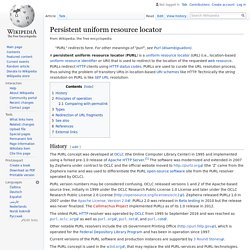
PURLs redirect HTTP clients using HTTP status codes. PURLs are used to curate the URL resolution process, thus solving the problem of transitory URIs in location-based URI schemes like HTTP. CNRI Handles - Handle.Net Registry. Handle System - Wikipedia. As with handles used elsewhere in computing, Handle System handles are opaque, and encode no information about the underlying resource, being bound only to metadata regarding the resource.
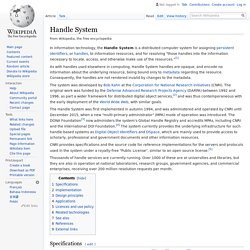
Consequently, the handles are not rendered invalid by changes to the metadata. The system was developed by Bob Kahn at the Corporation for National Research Initiatives (CNRI). Apache Lucene - Welcome to Apache Lucene. International Image Interoperability Framework.